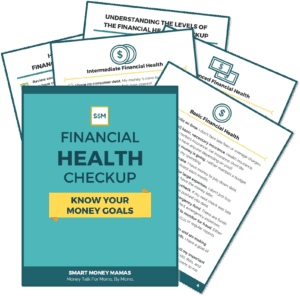I would like to thank Smart Money Mamas for lending me her platform to share my experience in working with couples to achieve financial success. Especially since I am going to challenge a good portion of what the personal finance community and blogosphere have to save about
paying down debt.
Now, you may be wondering what right do I have to take on the personal finance elite and the parade of personal finance bloggers parroting what they say? Well, I have worked in personal finance for nearly 20 years, helping families achieve their financial goals. Looking back, I realize the most valuable thing I got from my career of helping people wasn’t professional knowledge, but experience.
Experience in funny. Those without it insist that it doesn’t matter, and those with it know better.
I read a story in a muscle magazine about a big-time bodybuilder who was preparing for the Mr. Olympia competition. What I found interesting in the story was how this bodybuilder and his coach were trying different diets and nutrients. The coach figured he needed more sodium. So, the bodybuilder was eating burgers and fries in the hotel room the night before a huge competition.
The nutrition coach knew exactly what I have come to learn. Advice needs to be tailored to the people receiving it. What may work for one person, or even the majority of people, may not work for YOU specifically or YOUR situation.
If you’re reading blogs, like Mama Fish Saves, then most likely you’re not looking to (or ready to) hire a financial coach, and that’s OK. This blog has a lot of great resources and I am going to share my experience and some best practices to help you get your significant other on board financially.
Table of Contents
Starting at the Beginning
The other day I was reading a blog post about paying off debt. It went something like this: “I was in debt and that was stupid. Now I am not in debt, so I’m smart. If you want to be smart like me, then do ABC”.
Does that sound familiar? It’s the basic premise of just about every get out of debt story. It’s the tough love approach to finance, and I have news for you: it doesn’t always work. Here’s why.
People do not like to be attacked!
Have you ever watched a show like Dr. Phil where he and the audience start laying into some guest over their foolish behavior? It makes for some good drama. However, how does the guest usually react? Normally, they dig their heels in, become defensive, or even go on the attack themselves.
When you are part of a loving committed couple, part of your self-worth is tied to being a productive member of the relationship. No one wants to look “stupid’ to their partner. When partners disagree on finances and we need to get them on the same page “tough love” can backfire.
I see this happen at group meetings as well, such as Dave Ramsey meetings. “Tough love” in a group setting will do one of a few things.
- Some people will take to the tough love and adopt it hardcore.
- Others will give into peer pressure go along with it but the engagement of the principals will be shallow.
- But many people will see it as bullying, get turned off and retreat to the comfort of what they were previously doing.
We need to change the narrative
The debt, for whatever reason, happened. Maybe it was greed or stupidity. Maybe it was a medical emergency, failed business, or failed previous relationship. But we need to stop thinking of the debt as a “mistake” that must be erased as quickly as possible. This kind of negative thinking is counterproductive and can lead to an unhealthy relationship with money.
Thinking back to fitness, if someone is overweight, does the fitness and medical community tell them they need to lose the weight immediately? Or instead are they encouraged to lose weight in a healthy manner? By making responsible lifestyle changes that allow them to shed 4 to 8 pounds a month. Most pros advocate the latter. Because people who lose weight by making sustainable changes with food and fitness are more likely to keep the weight off.
Have you heard of yo-yo diets? This is where people lose weight and gain it all back.
Well, you heard it here first, there are yo-yo debt pay down plans. These are the plans where people pay down debt too rapidly., Putting too much money towards debt makes them unprepared for some emergency, ironically forcing them back into debt.
How to get your partner on board and out of debt.
1. Stop the judgment
I suspect personal finance is the only form of “help” where everyone commonly and routinely judges each other. With the expectation of maybe Dr. Phil, you don’t see psychologists and marriage counselors routinely telling everyone what they are doing is stupid.
You cannot drive a car solely using the rear-view mirror. If you want to get your significant other on board, you must move beyond judgment and look to the future.
2. Focus on the positive
Paying down debt should not be “the goal”. The goal should be to have a healthy relationship with money. In order to form a healthy relationship with money you need a mixture of short-term goals and long-term goals.
Why both? Because if you focus solely on long-term goals, the goal is too ‘abstract.’ You can’t see the light at the end of the tunnel. If you only focus on short-term goals, you may be tempted to modify the goals or may fail to plan for the future.
May I torture the fitness analogy further? Imagine if you tried to lose weight solely by cutting calories and never eating your favorite foods. How sustainable would it be? Do you think you might be tempted to cheat on the diet? Or even give it up entirely?
Now imagine instead you choose to cut calories and exercise most of the week. However, one day a week you gave yourself a cheat day. Where you eat your favorite foods, have some wine or a beer, and do not worry about calories.
As, long as you don’t go crazy on your cheat day, having one day where you go a bit over on your calories is not going to slow down your progress and it makes the sacrifices of the rest of the week more bearable.
If you’re having trouble getting your partner on board with paying down debt, focus on creating a plan that has a mixture of short and long-term goals and plenty of rewards along the way.
Set up a financial “cheat day” with an allowance, where once a week or month you each can spend a certain amount of money on whatever frivolous item you want.
3. Develop a financial disaster preparedness plan
Some people have trouble saving and paying down debt because of previous defeats. It can be soul crushing to work and sacrifice, scrimp and save, and then when you think you’re pulling ahead, some emergency knocks you back to square one. Repeat that a few times, and it is no wonder why someone may just give up on saving.
Having a financial disaster preparedness plan may provide the confidence to get your partner saving and paying down debt. This is money set aside to cover your unexpected expenses.
4. Get help
If you’ve tried the first three steps and aren’t making progress, you may need to consider professional help. Sometimes, some outside perspective is necessary. When two partners are on opposite sides of an issue, sometimes having an objective third-party propose a solution in the middle is helpful.
Just like people don’t like to be wrong, we are similarly reluctant to compromise. Sometimes it’s easier for a coach to offer the middle ground.
Additionally, you may be in other your heads. If there may be emotional reasons why a partner is reluctant to change, visiting a licensed psychologist or coach may save your relationship and your money.
The key to building a successful financial relationship is understanding that no couple is the same. The advice that works for the members of your church, neighbors, and co-workers may not work for you and your partner. Don’t judge yourself by other people’s’ standards.
If it takes you a bit more time to pay off debt, but you build a healthier, happier relationship with your partner and money, than that is the perfect answer for you.
Author Bio: Michael has worked in the financial services industry for nearly 20 years. He lives in rural PA with his wife, two children, and too many animals. Michael shares his experience, unique insights, and profiles inspirational success stories at Your Money Geek.








I agree, but would add that often the most important step is sitting down and assessing the situation. Much like many of us do at work, the first 30 minutes of an hour long meeting is “assessing where we are” and totally talking through that before we create a plan.
I think many people want to jump to action too quickly, especially in close relationships. I’d suggest spending more time up front getting alignment on current state and then coming up with a co-created plan.
Keep up the great articles.
Absolutely! Regular open discussion is key. You need to know your partner’s motivation and baggage before you can create a plan both can stick to.
I like this post. It’s informational without being judge-y. Money is a hard topic to discuss between partners, and sometimes even harder to write about. Thanks for sharing!
I really like the perspective being offered in this post. Changing the narrative about debt is so important, especially in long term relationships. I’ve been with my partner for over 20 years. And while I haven’t been judgmental about where the debt came from (we were BOTH major spenders back in the day), I haven’t exactly proposed a smooth transition for our debt payoff strategy.
Meaning, my recent obsession with becoming debt-free probably came out of nowhere, from his perspective. And now he’s scratching his head, trying to figure out where the “old me” went.
And while I get frustrated with his reluctance to stop spending, he’s probably equally as frustrated with my 180 degree pivot on credit and spending. Thanks for highlighting the differing mindsets — and maybe it is time to contemplate some outside help …